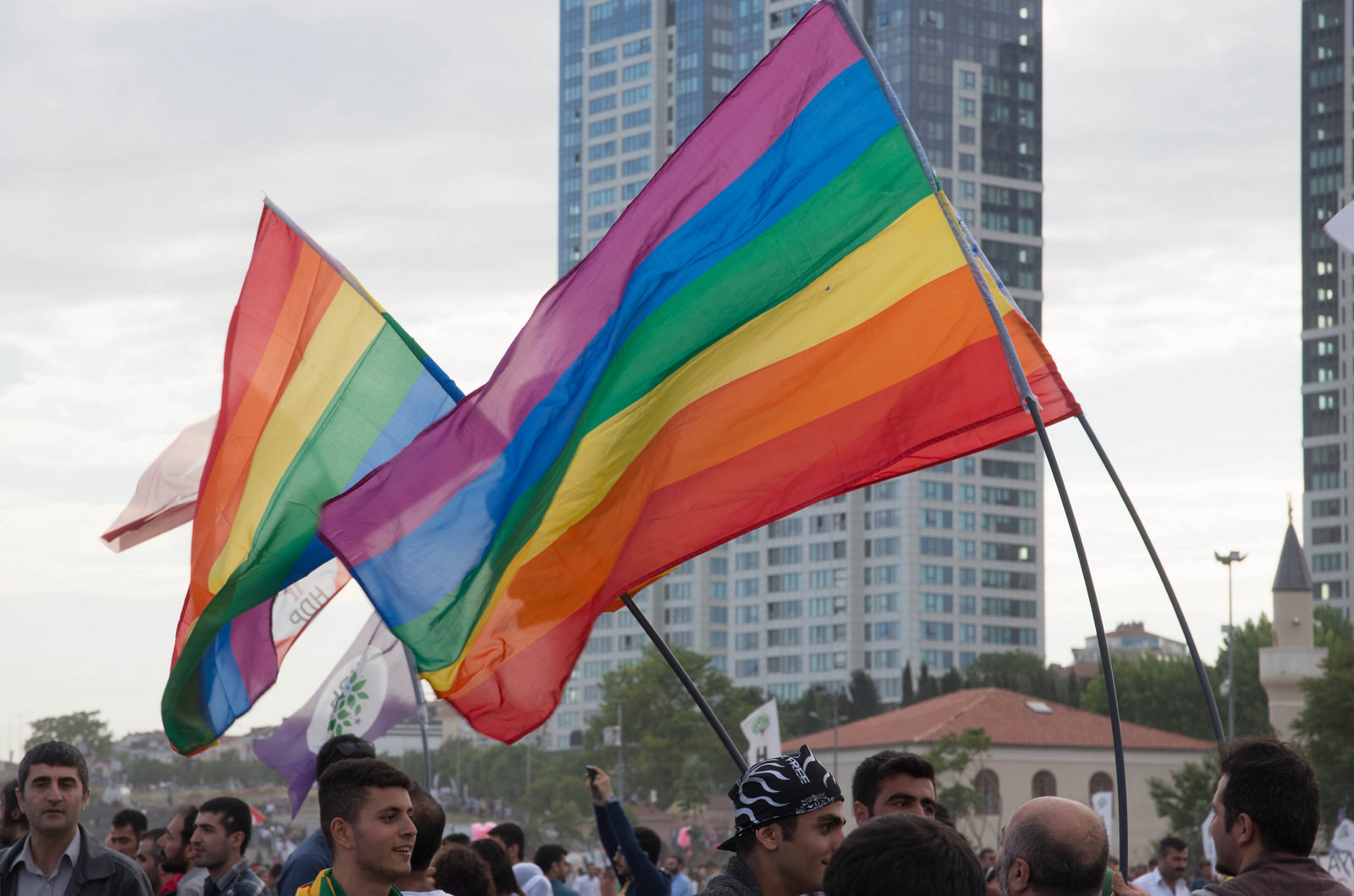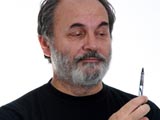LGBTQI Rights in 13806212015
by Tarık Günersel / July 28, 2015 / No comments

Rainbow flags wave in Turkey. Photo courtesy of Flickr user Julia Buzaud.
An overview of the struggle for LGBTQI rights in Turkey, and a proposal for tracking the chronology of human interactions.
“God forbids same-sex intercourse,” argues the Islamist website Suffagah in Turkish, echoing a widespread Christian attitude: “We must prevent or stop such unethical acts and tendencies by physically intervening or at least by warning.” You can imagine the types of unwritten punishment after seeing a few execution visuals recorded in some countries such as Iran and Saudi Arabia.

- Life is words in action, literature is action in words.
- Humans are about to destroy their spaceship Earth. Some of them are aware of this and they try to change the course of events. Will they succeed? Will more humans be alarmed and do something?
- Literature is vital and translators are messengers of world peace.
- Though I shall focus on the literary scene in Turkey and its problems regarding freedom of expression, I shall not omit the other parts of our planet. Today local is global and vice versa.

- Tarık Günersel worked as a dramaturg at Istanbul Metropolitan Theater. He has acted on stage and screen and directed some of his plays.
- Günersel’s works include the mosaic-epic Breaths of Infinity and the essay How’s your slavery goin’? His Becoming is a collection of his aphorisms and a selection of ideas from world wisdom. He has recently initiated the Earth Civilization Project with the support of several intellectuals from various parts of the planet. His short stories are available in one volume: My 300th Birthday Speech.
- Among his plays are The Golden Fleece; Nero and Agrippina, on the 17th c. Ottoman Sultan Mehmed IV; Armored Wolf, on Lev Tolstoy and Sophia Tolstaya; Threat, a monodrama; Our Anne Frank, Half A Glass of Water, on the rise and execution of Prime Minister Adnan Menderes; and Billennium. Tarık has written the libretti of composer Selman Ada’s operas Ali Baba & 40 (also staged in German at Wuppertal Oper), Forbidden Love, Another Planet and the oratorio Blue Dot. His Turkish translations include works by Samuel Beckett, Vaclav Havel, Savyon Liebrecht, Arthur Miller and Perry Anderson. He has recently initiated the Earth Civilization Project with several intellectuals from various parts of the planet.
A parallel step has been taken by the Constitutional Court (or Supreme Court) of Turkey in upholding an article of the Turkish Penal Code that prohibits visual and/or written material displaying (or about) oral, anal, group, and same-sex relations. If you keep a short video or photo at home and the police find it, you face one to four years in prison.
The best-known transgender figure in Turkey is the singer Bülent Ersoy. Assigned male at birth, Ersoy identified as female and transitioned in the 70s. After the military coup d’état in Turkey in 1980, she was forbidden from singing on stage for years. Upon invitation at social gatherings, she would sing sitting at a table with her close circle.
Enter the LGBTI coalition
More and more people know that the initials LGBT stand for lesbian, gay, bisexual and transgender, but what does that “I” stand for?
Intersex. Meaning? Here is an excerpt from the related article of ISNA, Intersex Society of North America: http://www.isna.org/faq/what_is_intersex.
“Intersex is a socially constructed category that reflects real biological variation… Nature presents us with sex anatomy spectrums… In human cultures, sex categories get simplified into male, female, and sometimes intersex, in order to simplify social interactions, express what we know and feel, and maintain order. So nature doesn’t decide where the category of “male” ends and the category of “intersex” begins, or where the category of “intersex” ends and the category of “female” begins. Humans decide… Rather than trying to play a semantic game that never ends, we at ISNA take a pragmatic approach to the question of who counts as intersex. We work to build a world free of shame, secrecy, and unwanted genital surgeries for anyone born with what someone believes to be non-standard sexual anatomy.”
Pride Parade in Turkey
For 22 years, the Turkish LGBTI coalition organized a Pride Parade—mainly in Istanbul. Even last year, when the parade was during Ramadan, the Islamic month for fasting, there was no police intervention. Surprisingly, prior to the general election in June this year, some relatively modern minds of the ruling Islamist-conservative AK Party mentioned those parades in the election propaganda leaflet proudly emphasizing their openness—avoiding mentioning the police brutality in the 2013 Gezi Park protests. But the 23rd parade was met with police violence, displaying the dominant tendency of the AK Party.
PEN sides with LGBTQI
PEN International sides with the sexual minorities as part of the Human Rights movement, including Q for Queer: http://www.pen-outwrite.org/lgbtqi-resolution/
Year 13806212015
Revising my previous proposal, instead of choosing the invention of writing as the turning point for chronology, I now suggest beginning with the age of our Universe: 13.8 billion years. Referring to the split between our distant ancestors and those of our closest relatives, chimpanzees, we can add 6 million. As for the evolution of Homo sapiens, how about roughly 200,000 years? And the beginning of agriculture? 10 millennia BP (Before Present)? But bearing in mind how widespread “2015” is, for the sake of the easiness of adaptation, let’s refer to the 12,000 year-old Göbekli Tepe, the recently discovered architectural site in southeastern Anatolia, in today’s Turkey. 13,806,212,000. Let’s feasibly add 15 and get rid of the commas: 13806212015.
So Universal Year (UY) is the Cosmological Time connected to the evolution on Earth and the human factor. For practicality, we could use the last five digits: 12015.
Now we can accordingly prepare a timetable that will help us overcome the problematic divide of BCE/CE and better see the flow of interactions:
Agriculture began around 13806202000.
Writing was invented in c. 13806206500, or briefly in 6500.
Thales, the first known significant mathematician considered to be the first naturalist, contributed around 9400.
Sophocles wrote Oedipus the King and Antigone around in the 95th Century.
Spartacus was born in 111 BCE, thus in 9899, and crucified when he was 40, in 9943.
Jesus was born about 50 years later, in or around 9996, and crucified in his 30s—around 1026.
Leonardo da Vinci was born in 11452.
Shakespeare was born in 11564.
116-18th centuries: Scientific Revolution.
120th century: Quantum and Relativity Theories, World Wars including the Cold War, A-Bomb, revolutions, UN, Universal Declaration of Human Rights, decolonization, EU, computerization, DNA science, walking on the Moon, the Internet, nuclear tragedies, solar energy…
Do you have any plans for 12016?




